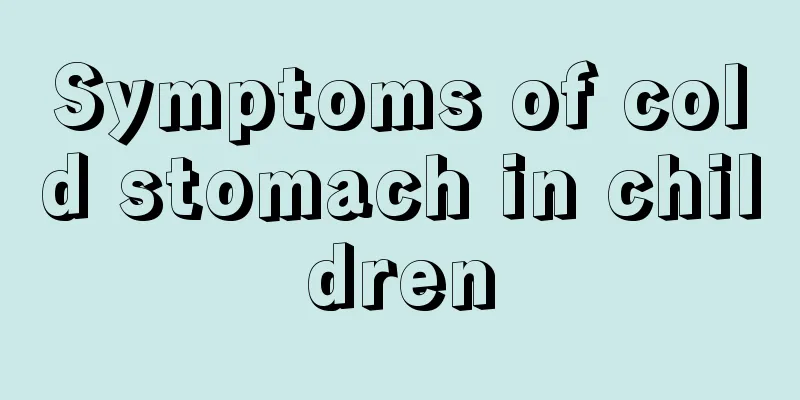Symptoms of cold stomach in children

|
The summer and autumn seasons are about to pass, and the cold winter is about to come. At this time, we must pay attention to keeping warm and not let ourselves or our family members get sick. We all know that children have relatively poor resistance and like to play outside. If they are not careful when the weather changes, they are likely to suffer from certain diseases. Stomach cold is one of the more common diseases. In order to detect this disease earlier, we need to learn the symptoms of this disease. What are the symptoms of stomach cold? The common clinical manifestation of stomach cold is pain caused by cold weather, cold food and cold sensation. The pain is accompanied by a cold feeling in the stomach, which is relieved by warmth. Many patients with stomach problems dare not eat cold food, or they will suffer from stomach pain, diarrhea, etc. when the weather turns cold and the temperature drops. The symptoms of stomach cold are as follows: 1. Stomach pain When stomach cold is severe, symptoms of stomach pain will occur. Especially in the hot summer, when you eat cold food or drink cold drinks, do you feel pain and the pain is accompanied by a cold feeling? After warming the stomach, the symptoms will be relieved. This is the stomach pain caused by stomach cold. 2. Vomiting Due to the reverse peristalsis of the esophagus, stomach or intestines accompanied by strong spasm and contraction of the abdominal muscles, the contents of the esophagus and stomach are forced out of the mouth and nose. Through vomiting, the contents of the stomach and part of the small intestine flow out of the mouth through the esophagus, and the harmful substances ingested into the stomach are expelled. 3. Abdominal pain Abdominal pain refers to pain below the epigastric region and above the pubic hair line, which is often paroxysmal and accompanied by a series of related symptoms such as nausea, vomiting and sweating. 4. Chills That is, being afraid of cold, feeling cold physically, and even wearing more clothes or covering yourself with a quilt indoors, or getting close to a fire to keep warm, the symptoms of being afraid of cold cannot be alleviated. Causes of stomach cold The main cause of stomach cold is related to eating habits, such as irregular diet and preference for eating raw and cold food. Frequently eating hot and cold foods together, eating at irregular times, or not eating at equal times of hunger and fullness will cause stomach cold over time. In addition, modern people's fast pace of life, mental stress, and irregular diet have caused the incidence of spleen and stomach diseases to become increasingly high. According to traditional Chinese medicine, the main causes of this syndrome are: deficiency of spleen and stomach yang qi; cold abdomen; excessive consumption of raw and cold food; fatigue and injury to the middle stomach, combined with exposure to cold pathogens, which lead to stagnation of yin and cold in the stomach. The main pathogenic factors of stomach cold can be summarized into four aspects: 1. Diet Patients with stomach cold often suffer from irritation of the mucous membrane due to stimulation by raw and cold food or water. 2. Lifestyle Often not eating on time, alternating between hot and cold food, and eating one meal and skipping the next will cause stomach cold over time. 3. Mental factors Fast pace of life, mental stress and irregular diet are also important reasons for the aggravation of stomach cold symptoms. 4. Weather reasons Patients with cold stomach are often afraid of cold weather, and often suffer from stomach pain, abdominal pain, diarrhea, etc. due to cold weather. What to eat for cold stomach For people with cold stomach, it is best to follow the following principles. 1. Eat more stomach-nourishing foods, such as millet, pumpkin, spinach, carrots, onions, garlic, ginger, etc. 2. Eat more cooked food. Many green vegetables are cool in nature and are best eaten cooked. 3. Eat less cold food. Don't drink too much cold drinks. Don't eat too much cold fruits, such as watermelon, grapefruit, etc. Food taken out of the refrigerator should also be brought to room temperature before eating. This not only reduces the body's energy consumption, but also protects the stomach qi. 4. It is best to eat fruits and vegetables during the day because the body is active during the day and eating cold foods is not a big problem. But eating these foods at night will cause the digestive system to become cold and may even trigger coughing and asthma. You can eat some apples, papaya, etc. at night, they will not harm the spleen and stomach. 5. Reduce adverse stimulation and avoid various irritating foods, such as strong liquor, strong coffee, raw garlic, mustard, etc. At the same time, avoid eating foods that are too hard, too sour, too spicy, too salty, too hot, too cold and too rough. |
<<: What are the symptoms of gastroptosis
>>: What causes pain in the little finger
Recommend
What is the cause of moles on the head?
It is inevitable for our human body to have moles...
What foods can improve breast milk quality?
If it is the first time to give birth to a baby, ...
Early detection of liver cancer symptoms is helpful in controlling the disease
Liver cancer is the most common type of cancer. M...
How long can you live with conservative treatment of mid-to-late stage lung cancer
How long can you live with conservative treatment...
What are the examination items for fibroids
What are the examination items for fibroids? In l...
Symptoms of an incomplete abortion
Artificial abortion is the most commonly chosen m...
What's the matter with the pain below the belly button
If you have pain below the navel, you should pay ...
Can I get a tooth filled when I have a cold?
The first important thing for people with bad tee...
How should nasopharyngeal cancer be prevented and what is the patient's diet?
Disease prevention is the most important thing. P...
What are the characteristics of stable angina?
The occurrence of stable angina pectoris actually...
What to do if you have a stuffy stomach
Sometimes you may feel a sense of stuffiness in y...
Is bladder blood clot bladder cancer? Bladder cancer will cause the body to have 4 "alarms"
Is bladder blood clot bladder cancer? This situat...
I didn't expect the effect of bear bile to be so powerful
Bear bile is the dried bile of brown bears and bl...
What to do if ovarian cancer metastasizes to the lymph nodes
What should I do if ovarian cancer metastasizes t...
What causes exfoliative dermatitis?
Many skin inflammations occur in the spring seaso...









